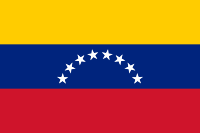
Photo from wikipedia
Background Toxocariasis is a widespread zoonosis caused by canine and feline Toxocara spp. In Venezuela, seroepidemiological studies in Aragua State have been carried out only in preschool children. The objective… Click to show full abstract
Background Toxocariasis is a widespread zoonosis caused by canine and feline Toxocara spp. In Venezuela, seroepidemiological studies in Aragua State have been carried out only in preschool children. The objective of this study was to determine the prevalence of anti-Toxocara spp. antibodies and identify clinical symptoms and risk factors of Toxocara spp. infection in school children in two municipalities of Aragua State of Venezuela. Methods A cross-sectional field study with 259 children between 6 and 12 y of age was conducted in six schools in Aragua State. Immunoglobulin G antibodies against Toxocara spp. by enzyme-linked immunosorbent assay, haematology and eosinophil counts were detected in blood. Participating families filled in a questionnaire and studied children were clinically evaluated by paediatricians. Results Anti-Toxocara spp. antibodies were detected in 14.3% of children. The seroprevalence in the schools studied ranged from 4.4% to 24.1%. Statistical associations with eosinophilia, decreased visual acuity, eyestrain, headache and paleness were found. Significant risk factors were contact with dogs, playing with dogs and playing with soil. Conclusions The identification of risk factors and their association with infection suggest that the infection is a problem in the municipalities studied, so screening for toxocariasis in school children should be recommended.
Journal Title: Transactions of The Royal Society of Tropical Medicine and Hygiene
Year Published: 2018
Link to full text (if available)
Share on Social Media: Sign Up to like & get
recommendations!